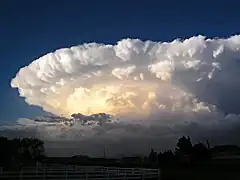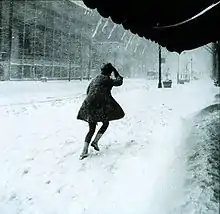The weather portal
Weather is the state of the atmosphere, describing for example the degree to which it is hot or cold, wet or dry, calm or stormy, clear or cloudy. On Earth, most weather phenomena occur in the lowest layer of the planet's atmosphere, the troposphere, just below the stratosphere. Weather refers to day-to-day temperature, precipitation, and other atmospheric conditions, whereas climate is the term for the averaging of atmospheric conditions over longer periods of time. When used without qualification, "weather" is generally understood to mean the weather of Earth.
Weather is driven by air pressure, temperature, and moisture differences between one place and another. These differences can occur due to the Sun's angle at any particular spot, which varies with latitude. The strong temperature contrast between polar and tropical air gives rise to the largest scale atmospheric circulations: the Hadley cell, the Ferrel cell, the polar cell, and the jet stream. Weather systems in the middle latitudes, such as extratropical cyclones, are caused by instabilities of the jet streamflow. Because Earth's axis is tilted relative to its orbital plane (called the ecliptic), sunlight is incident at different angles at different times of the year. On Earth's surface, temperatures usually range ±40 °C (−40 °F to 104 °F) annually. Over thousands of years, changes in Earth's orbit can affect the amount and distribution of solar energy received by Earth, thus influencing long-term climate and global climate change.
Surface temperature differences in turn cause pressure differences. Higher altitudes are cooler than lower altitudes, as most atmospheric heating is due to contact with the Earth's surface while radiative losses to space are mostly constant. Weather forecasting is the application of science and technology to predict the state of the atmosphere for a future time and a given location. Earth's weather system is a chaotic system; as a result, small changes to one part of the system can grow to have large effects on the system as a whole. Human attempts to control the weather have occurred throughout history, and there is evidence that human activities such as agriculture and industry have modified weather patterns
Studying how the weather works on other planets has been helpful in understanding how weather works on Earth. A famous landmark in the Solar System, Jupiter's Great Red Spot, is an anticyclonic storm known to have existed for at least 300 years. However, the weather is not limited to planetary bodies. A star's corona is constantly being lost to space, creating what is essentially a very thin atmosphere throughout the Solar System. The movement of mass ejected from the Sun is known as the solar wind. (Full article...)
Selected article
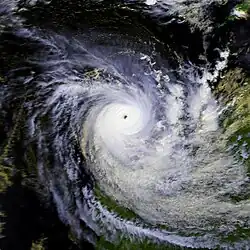
Severe Tropical Cyclone Orson was the fourth most intense cyclone ever recorded in the Australian region. Forming out of a tropical low on 17 April 1989, Orson gradually intensified as it tracked towards the west. After attaining Category 5 intensity on 20 April, the storm began to track southward and accelerated. The following day, the cyclone reached its peak intensity with winds of 250 km/h (155 mph 10-minute sustained) and a barometric pressure of 904 hPa (mbar). Orson maintained this intensity for nearly two days before making landfall near Dampier. The cyclone rapidly weakened after landfall as it accelerated to the southeast. After moving into the Great Australian Bight on 24 April, the storm dissipated.
Despite Orson's extreme intensity, damage was relatively minimal as it struck a sparsely populated region of Western Australia. Five people were killed offshore and damages amounted to A$20 million (US$16.8 million). The storm damaged a new gas platform that explored a possible oil field, believed to contain nearly 200 million gallons of oil. The damage delayed the project for nearly two weeks. The most severe impacts took place in Pannawonica, where 70 homes were damaged. Following the storm, clean up costs reached A$5 million (US$4.1 million). Due to the severity of the storm, the name Orson was retired in 1990 and later replaced by Olga.
Recently selected articles: Christmas 1994 nor'easter, Evansville tornado of November 2005, Typhoon Tip, More...
Did you know (auto-generated) -
- ... that weather whiplash is the phenomenon of rapid swings between extremes of weather conditions?
- ... that Eric Berger wrote about weather for the Houston Chronicle even before he became a certified meteorologist?
- ... that although used as the weather vane of a church, the Söderala vane was probably originally made for a Viking ship?
- ... that extreme event attribution estimates how much climate change causes weather events, such as the 2021 Western North America heat wave?
- ... that the 1st Weather Squadron, the 2016 Weather Squadron of the Year, reports on future battlefield weather conditions and assists during natural disasters?
- ... that the weather forecast for HD 189733 b is "Westerly winds at 2000 m/s, with molten glass showers"?
Selected image

More did you know...
...that the Flying river is the name given to the transport of water vapor from the Amazon rainforest to southern Brazil?
...that hurricane shutters are required for all homes in Florida unless impact-resistant glass is used?
...that the Joint Institute for Marine and Atmospheric Research is a combined weather and ocean research institute with the cooperation of the Office of Oceanic and Atmospheric Research and the University of Hawaiʻi?
...that the SS Central America was sunk by a hurricane while carrying more than 30,000 pounds (13,600 kg) of gold, contributing to the Panic of 1857?
...that a hurricane force wind warning is issued by the United States National Weather Service for storms that are not tropical cyclones but are expected to produce hurricane-force winds (65 knots (75 mph; 120 km/h) or higher)?
...that the Automated Tropical Cyclone Forecasting System is a software package for tropical cyclone forecasting developed in 1988 that is still used today by meteorologists in various branches of the US Government?
Recent and ongoing weather
- Wikinews weather portal
- March 26, 2021: Tropical moisture ceases to cause severe floods in South East Australia
- February 19, 2021: Winter storms hammer Texas, fatalities reported
- December 28, 2021: Typhoon Phanfone strikes Philippines
- February 1, 2022: Deadly floods in Brazil after heavy rainfall
- April 15, 2022: South African floods kill at least 300 people
- Weather of 2023
- 2023 Atlantic hurricane season
- 2020–21 North American winter
- 2023 Pacific typhoon season
- Tornadoes of 2023
This week in weather history...
November 28
1939: A smog event struck St. Louis, Missouri. The smog was so thick that cars needed headlights to drive during mid-day.
November 29
1992: A series of unusually powerful storms produced flash flooding, large hailstones, and two strong tornadoes in southeastern Queensland, Australia.
November 30: End of the East Pacific, Central Pacific and Atlantic hurricane seasons
1925: A late-season tropical storm made landfall just south of Tampa, Florida, eventually killing dozens of people, mostly due to sinking ships.
December 1
2013: Cyclone Alessia dissipated over the Northern Territory, Australia.
December 2
1996: The final WSR-57 weather radar was decommissioned at Charleston International Airport in Charleston, South Carolina. It was replaced by a new NEXRAD (WSR-88D) radar.
December 3
2004: Cyclone Agni, a very rare tropical cyclone which approached and may have even crossed the equator, dissipated just off the Somali coast.
December 4
2012: Typhoon Bopha, the strongest tropical cyclone on record to strike the island of Mindanao, Philippines, made landfall near Baganga. The storm hit with maximum sustained winds of 175 mph (280 km/h), and killed at least 1,900 people.
Selected biography
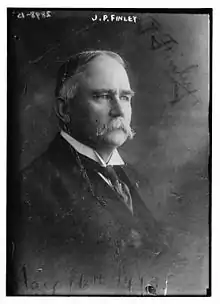
John Park Finley (April 11, 1854 – November 24, 1943) was an American meteorologist and Army Signal Service officer who was the first person to study tornadoes intensively. He also wrote the first known book on the subject as well as many other manuals and booklets, collected vast climatological data, set up a nationwide weather observer network, started one of the first private weather enterprises, and opened an early aviation weather school. (Full article...)
Previously selected biographies: Edward Norton Lorenz, Vilhelm Friman Koren Bjerknes, More...
Related portals
Quality content




Cirrus clouds
![]()
Cumulonimbus cloud
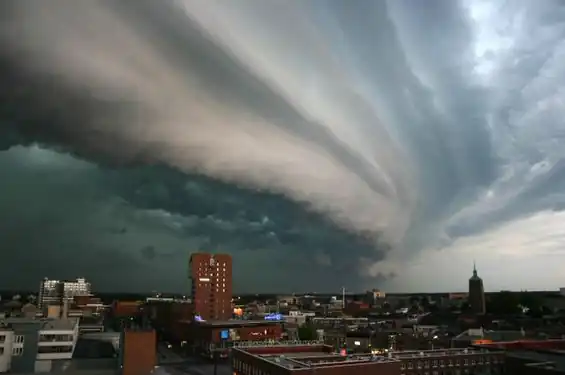
Rolling thunder cloud

Cirrus clouds
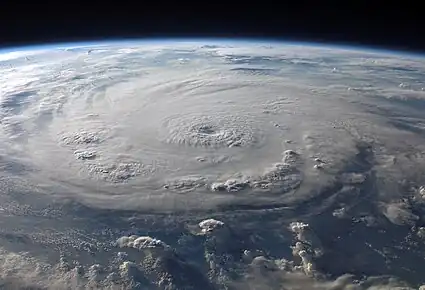
Hurricane Felix
More weather-related Featured Pictures...

- Category 5 Pacific hurricanes
- 1998 Pacific hurricane season
- 2003 Atlantic hurricane season
- Hurricane Isabel
- 1998 Pacific hurricane season
- Category 5 Pacific hurricanes
- Retired Pacific hurricanes
- More weather-related Featured Topics...

Feat. article candidates:
- Tropical Storm Ileana (2018) (Discussion)
Featured list candidates:
Feat. picture candidates:
Other candidates:
- Featured Article Review: 2005 Atlantic hurricane season (Discussion)
- Featured List Removal Candidate: List of storms in the 2005 Atlantic hurricane season (Discussion)

Subcategories
WikiProjects
The scope of WikiProject Weather is to have a single location for all weather-related articles on Wikipedia.
WikiProject Meteorology is a collaborative effort by dozens of Wikipedians to improve the quality of meteorology- and weather-related articles. If you would like to help, visit the project talk page, and see what needs doing.
WikiProject Severe weather is a similar project specific to articles about severe weather. Their talk page is located here.
WikiProject Tropical cyclones is a daughter project of WikiProject meteorology. The dozens of semi-active members and several full-time members focus on improving Wikipedia's coverage of tropical cyclones.
WikiProject Non-tropical storms is a collaborative project to improve articles related to winter storms, wind storms, and extratropical cyclones.
Wikipedia is a fully collaborative effort by volunteers. So if you see something you think you can improve, be bold and get to editing! We appreciate any help you can provide!
Associated Wikimedia
The following Wikimedia Foundation sister projects provide more on this subject:
-
 Commons
Commons
Free media repository -
 Wikibooks
Wikibooks
Free textbooks and manuals -
 Wikidata
Wikidata
Free knowledge base -
 Wikinews
Wikinews
Free-content news -
 Wikiquote
Wikiquote
Collection of quotations -
 Wikisource
Wikisource
Free-content library -
 Wikiversity
Wikiversity
Free learning tools -
 Wiktionary
Wiktionary
Dictionary and thesaurus
Other Portals
-
 List of all portalsList of all portals
List of all portalsList of all portals -
 The arts portal
The arts portal -
 Biography portal
Biography portal -
 Current events portal
Current events portal -
 Geography portal
Geography portal -
 History portal
History portal -
 Mathematics portal
Mathematics portal -
 Science portal
Science portal -
 Society portal
Society portal -
 Technology portal
Technology portal -
 Random portalRandom portal
Random portalRandom portal -
 WikiProject PortalsWikiProject Portals
WikiProject PortalsWikiProject Portals
What you can do
 |
Here are some tasks awaiting attention:
|

